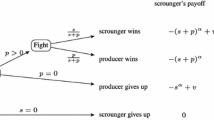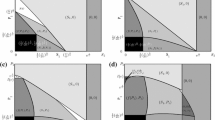Abstract
We extend the game theoretic model of kleptoparasitism introduced by Broom and Ruxton (1998, Behav. Ecol. 9, 397–403) in two ways: we allow for asymmetric contests, where the probability α of the challenger winning can take any value from 0 to 1; and we allow the handler to choose not to resist the challenge, but to immediately concede and relinquish its food to the challenger. We find, in general, three possible evolutionarily stable strategies—challenge-and-resist (Hawk), challenge-but-do-not-resist (Marauder) and do-not-challenge-but-resist (Retaliator). When α = 1/2, we find that Hawk and Marauder are the only ESS’s, in contrast to the result of the original model; we also find an overlap region, in parameter space, where two different ESS’s are possible, depending on initial conditions. For general α, we see that all three ESS are possible, depending on different values of the environmental parameters; however, as the average time of a contest over food becomes long, then the Marauder strategy becomes more and more prevalent. The model makes a potentially significant prediction about animal behaviour in the area of kleptoparasitism, that a searcher, when it meets a handler, will only decline to attack that handler when α < 1/2 i.e.when the defender is more likely to win. One possible converse of this statement, that a handler whose probability of success is greater than 1/2 should always resist a challenge, is not true.
Similar content being viewed by others
References
Barnard, C. J. and R. M. Sibly (1981). Producers and scroungers: a general model and its application to captive flocks of house sparrows. Anim. Behav. 29, 543–555.
Beddington, J. R. (1975). Mutual interference between parasites or predators and its effect on searching efficiency. J. Anim. Ecol. 44, 331–340.
Brockman, H. J. and C. J. Barnard (1979). Kleptoparasitism in birds. Anim. Behav. 27, 487–514.
Broom, M. and G. D. Ruxton (1998). Evolutionarily stable stealing: game theory applied to kleptoparasitism. Behav. Ecol. 9, 397–403.
Broom, M. and G. D. Ruxton (2003). Evolutionarily stable kleptoparasitism: consequences of different prey types. Behav. Ecol. 14, 23–33.
Furness, R. W. (1987). Kleptoparasitism in seabirds, in Seabirds: Feeding Ecology and Role in Marine Ecosystems, J. P. Croxall (Ed.), Cambridge University Press.
Holmgren, N. (1995). The ideal free distribution of unequal competitors: predictions from a behaviour-based functional response. J. Anim. Ecol. 64, 197–212.
Mesterton-Gibbons, M. and E. S. Adams (1998). Animal contests as evolutionary games. Am. Sci. 86, 334–341.
Ruxton, G. D., W. S. C. Gurney and A. M. de Roos (1992). Interference and generation cycles. Theor. Popul. Biol. 42, 235–253.
Ruxton, G. D. and A. L. Moody (1997). The ideal free distribution with kleptoparasitism. J. Theor. Biol. 186, 449–458.
Author information
Authors and Affiliations
Corresponding author
Rights and permissions
About this article
Cite this article
Broom, M., Luther, R.M. & Ruxton, G.D. Resistance is useless?—Extensions to the game theory of kleptoparasitism. Bull. Math. Biol. 66, 1645–1658 (2004). https://doi.org/10.1016/j.bulm.2004.03.009
Received:
Accepted:
Issue Date:
DOI: https://doi.org/10.1016/j.bulm.2004.03.009




